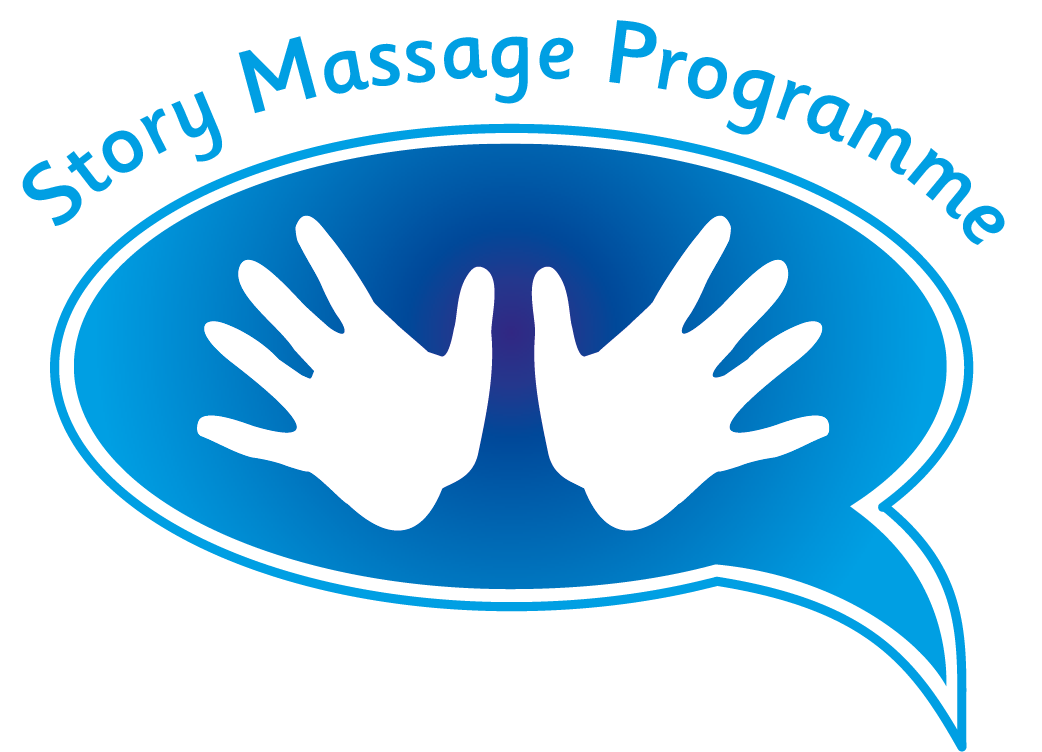How do you run a successful Story Massage Workshop for parents/carers within a school setting? Here are some tips from Justine Horn, Depute Head, and Jennifer Monteith, nurture teacher, at Thorntree School in Glasgow. They say their recent event was a very relaxed afternoon with lots of bonding, positive touch and smiley faces!
1. Promoting the workshop to parents/carers
The session was opened out to the whole school. We promoted it at the two previous Parents’ Evenings with displays of the wallcharts, a PowerPoint and some photos. We tried to speak to parents about it too. Just before the event, we sent out a couple of text reminders to all parents asking them to come along for a relaxing afternoon sharing Story Massage with their children.
2. Introducing the session
The workshop lasted from 2-3pm. We were so pleased that 15 parents came, some brought their young children with them. And we were grateful for the help of Katrina Heggie, Support for Learning Worker for Nurture, who is also trained in the Story Massage Programme.
As each parent arrived, we arranged for their children to be collected from their classes. During this time we spoke briefly about the benefits of the Story Massage Programme, how it can be used at home and the basic rules such as asking permission and saying thank you. Then when everyone was present, we started demonstrating the ten strokes.
3. Teaching the Story Massage strokes
We know that the children are all confident with the strokes so we encouraged the adults to practice on their child/children. It was a new experience for many of them but they all joined in and loved it. We went around the room helping them and answering any questions. It was lovely to see the children showing off their Story Massage skills! Then we all did a simple massage story together. We used a version of Incy, Wincy Spider written by children in our Treetops Nurture Room.
4. Sharing simple nursery rhymes
We invited them to find a comfy space to work with their children. There was a choice of chairs or cushions. We gave out some simple massage stories and asked the adults and children to take turns trying them out.
Stories included Baa Baa Black Sheep and the nursery rhymes from the Story Massage Book. We also gave them a massage story about Spring too. It was so good to see families having such fun together.
5. Writing massage stories
Finally, we gave out some blank Story Massage templates and strips of stickers and encouraged the adults to have a go at writing a massage story with their children.

They created some fantastic new massage stories. It is important to make time in a workshop for writing stories as this brings everything together. And gives a great sense of satisfaction.
6. Handouts to take home
Everyone took home a handout with a reminder of each stroke and how to do it. And also copies of the massage stories we had practiced during the afternoon, as well as the ones they made up. It was a really lovely interactive session as you can see from all the photos! We are looking forward to organising another one.
More about the Story Massage Programme
The Story Massage Programme combines positive touch with the fun and creativity of storytelling. Ten simple massage strokes form the basis of the programme. These ten strokes each have a name, such as The Circle or The Sprinkle, and an easy to recognise symbol making it accessible for all. It is a fully inclusive activity. No clothing is removed and no oil is used.
Would you like to train in the Story Massage Programme?
Are you inspired by the work of Thorntree Primary School with their parent workshops? Then do take a look at our Online Training Course.
On the course, you will learn how to share the ten Story Massage strokes, how to adapt familiar stories and create some sensory stories of your own. Ideal for teachers, parents, well-being coaches, therapists, SEN staff, support staff, Early Years practitioners, those working with people with additional needs, everyone with an interest in sharing positive touch activities with adults or children.












